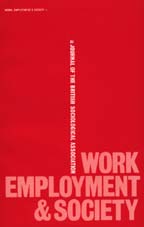Article contents
Professional Work and Professional Careers in Manchester's Business and Financial Sector
Published online by Cambridge University Press: 19 October 2000
Abstract
This paper examines professional work and professional careers and the extent to which professionals face change, uncertainty and risk in their careers. The key issue is whether the power and privilege of the professions is being undermined. It draws on research from Manchester's business and financial sector including accountancy, law, actuarial work and corporate finance. Interviews with senior partners and managers in a range of organisations indicate that important changes in the professions are taking place including diversification, inter-professional competition, organisational change and specialisation. There has also been a change in relationships with clients and an intensification of work. Interviews with junior professionals show that job mobility is high in the early career although most envisaged staying with one organisation for the majority of their careers. Hours of work were long but not necessarily seen as onerous. They were well remunerated in commanding high salaries at a relatively young age with the prospect of greatly enhanced rewards in the future. Few had experiences of redundancy and none of unemployment although the consensus of opinion was that the professions are no longer a job for life. Perceptions of insecurity were greater than experiences of it. It is argued that the privilege and power of the professions can only be understood in the context of the organisations in which they are employed and the political economy in which those organisations operate. Increased economic competitiveness has led to changes in professional work but professionals continue to enjoy advantaged careers in the labour market.
- Type
- Research Article
- Information
- Copyright
- © 2000 BSA Publications Ltd
- 22
- Cited by




